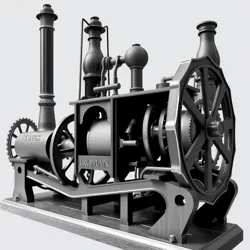Industrial Revolution
The Industrial Revolution was a period of profound transformation in the late 18th and early 19th centuries, marked by the shift from agrarian economies to industrialized and urban societies. This era saw the introduction of mechanized manufacturing processes, which drastically altered societal structures, economic systems, and the course of technological development.
Origins
The Industrial Revolution began in Great Britain in the late 1700s. Several factors contributed to its emergence, including the availability of natural resources such as coal and iron ore, a growing population that provided labor and markets, and advancements in agricultural practices that increased food production.
Key Developments
Mechanization
The introduction of mechanized tools and machinery, such as the spinning jenny and the power loom, revolutionized the textile industry. These inventions increased production capabilities and efficiency, reducing reliance on manual labor.
Steam Power
The development of the steam engine by James Watt and others enabled new possibilities for transportation and manufacturing. Steam power facilitated the creation of railways and steamships, enhancing the movement of goods and people.
Metallurgy
Advancements in industrial metalworking techniques played a critical role during this period. Techniques such as casting and forging allowed for the mass production of metal parts and machinery, supporting the rapid expansion of industries like transportation and construction.

Urbanization
As industries grew, people flocked to urban centers in search of work, leading to significant urbanization. This shift resulted in the development of new social classes and the expansion of cities, which were often characterized by poor living conditions.
Impact on Society
The Industrial Revolution had far-reaching effects on society. It led to increased productivity and economic growth but also brought about challenges such as labor exploitation and environmental degradation. The rise of factories changed the nature of work, leading to the formation of labor unions and movements advocating for workers' rights.
Technological Legacy
The technological innovations of the Industrial Revolution laid the groundwork for future advancements. The principles of mass production and mechanization developed during this period continue to influence modern manufacturing and industrial practices.
Environmental and Social Challenges
The rapid industrialization introduced during the Industrial Revolution also resulted in significant environmental and social challenges. Issues such as pollution, deforestation, and poor working conditions prompted early environmental and labor reform movements.
See Also
- Spinning Jenny
- Agricultural Practices
- James Watt
- Industrial Metalworking Techniques
References
- "The Industrial Revolution: A Historical Perspective," by A. Thompson.
- "Mechanization and its Impact on Society," Journal of Industrial History.
- "Environmental Consequences of the Industrial Era," by R. Green.
Linked articles: None